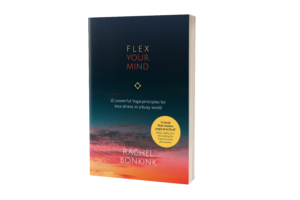We can be our own worst enemy, I should have done this, said that, I’m such a ….
Thinking like this, allowing the negative self-talk and beliefs to take over, has an impact on your overall wellbeing. Moreover, this constellation of negative thoughts can increase your stress levels towards chronic stress and even lead to depression when repeated enough. In this article we explore how meditation can help you deal with chronic stress.
Stress is not necessarily bad: it gives extra focus and energy which is great when performing in sports or delivering a presentation. It’s the continuous stress, the chronic stress that needs to be dealt with.
Calm down
A poor diet with a lot of processed foods has a negative effect on the body in the long term. The same counts for stress, research shows us that stress gives an increase in cortisol levels, the blood pressure and the heart rate go up; your whole body is in a state of alert.
The research is also there now to show us that meditation can help heal, reduce and revert those effects. Meditation does really help to deal with chronic stress.
Meditation literally calms us down; it usually includes taking nice long breaths which automatically relaxes us and engages the parasympathetic nervous system.
You can’t force yourself to relax, that would be like forcing yourself to sleep.
Befriending your mind works better to be able to deal with stress better or even better.
It is about creating a sense of calm, of peace of mind.
Burnout
There is definitely a need for more peace of mind. A recent Belgian study states that the number of burnouts has increased by 40%, in 4 years. Not including this year even or the glorious year 2020 …
One of the main issues, as explained is that people don’t recharge. Most people are so entangled in work, having no separation any more between their private and their working life.
Add to the mix that the overall screen time is absolutely ridiculous these days and the information input we are bombarded with is overwhelming.
We are pushed to our limits on all fronts.
Distraction verses Recharging
Whatever works to distract us, to not think about work, to stop worrying for a moment. But, the question is: Are we confusing distraction with recharging?
Watching the news, mindlessly scrolling, running, sports, sex, … whatever works to not think, but does all this busyness truly recharge us? Might this running around, always being busy, might be the very thing that gives us chronic stress?
In my definition of Meditation, distraction is the exact opposite of meditation.
Meditation is about attending to the mind. Investigating, exploring the mind, really checking what is on our mind.
Attending to whatever arises, like a flight attendant attending to his or her passengers.
Chilling
Nowadays, the term meditation is thrown around loosely. Someone is sitting with their eyes closed and we say that they are meditating. You can do many things with your eyes closed 🙂 : sleeping, thinking, desiring, fantasising, worrying, planning, spacing out.
However, exploring the Mind or training the mind or even sharpening the mind is rather different from chilling and dreaming.
Emptying the mind of the known to be open for the unknown. – Krishnamurti
So, meditation to deal with chronic stress?
Meditation in Tibetan is translated as ‘to become familiar with’. To become familiar with your own mind and to get more insight into your own mind.
When you become familiar with the feelings that you have at any given moment, you can notice when you’re having thoughts that do not serve you.
You become aware of obsessive planning or worrying for example, which gives you the opportunity to think differently.
All it takes is giving yourself enough break time to let that awareness in. Taking the time to notice that you’re all tensed up in your shoulders. Pausing to stretch your legs for a moment whilst being mindful about the body.
Giving body and mind some time to recharge, even or should I say, especially in between meetings and at work.
Coming home
Meditation is to come home, to feel at home in body and mind.
Sometimes it feels like we have lost the connection with ourselves. And while it really feels like it, this can never be true. Very often, all it takes is to calm down and breathe. And to trust that everything will work out, it always does, in whatever form.
Maybe not the form that you expected or hoped for, but it always works out.
Just do it
A regular meditation practise will feed that sense of trust.
It is impossible to learn this by reading, you really have to experience it.
Therefore, the invitation is there for you to take 15 minutes, today, NOW …. to follow this guided meditation that I made for you. No need to sign up or leave your email, just settle in, make yourself comfortable and click the link below.
The following meditation is just 15 minutes long and will help you in sharpening the mind. For both new as well as more experienced meditators: click here.
Rachel Bonkink
Rachel is a meditation teacher and the author of the book, Flex your Mind.
She is a mindset coach for busy professionals and the founder of Revealing Vajra-amazing yoga retreats. In a past life, she fully enjoyed the corporate life as an operational director of a medical market research firm.








Leave a comment